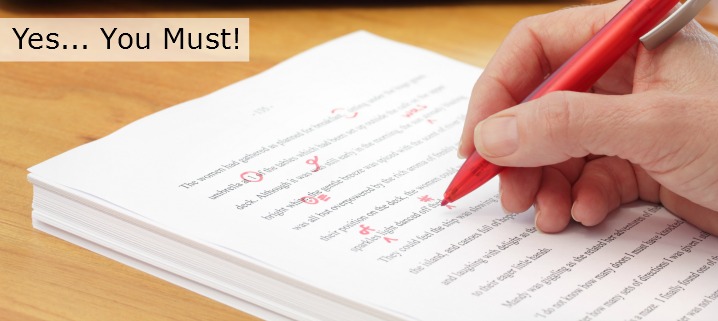Proofreading?? What a drag! Must I?
Are you James Patterson? The world’s best selling author does not even have to write his own books, let alone proof read them. He just comes up with fabulous and compelling idea after fabulous and compelling idea, writes ‘em down in a careful and detailed synopsis and then passes that on to one of his many “co-authors” to, well, author.
Not James Patterson? OK, then how many bestsellers have you sold so far? If you have a good history of books that have sold well, chances are you will have an agent, a publisher, a copy editor and a whole litany of people ready and willing to check your manuscript for errors and to help you every step of your way.
If you haven’t already been substantially published, you are going to have to do the hard graft of checking, rechecking and proofreading yourself. Many beginning writers think that once they have completed the creative part of their work, they have completed their task. Unfortunately that’s not the case. There’s the little matter of attempting to sell your writing. Proofreading is essential if you want to sell your work.
Here’s the rub. Unless your work is completely error free, the chances of it even being read, however brilliant it is, are remote.
So, is proofreading a worthwhile use of your time and talent? You bet it is. How many editors have thrown their hands up in irritation and hit the delete button to be rid of a manuscript that may have had all kinds of excellent attributes going for it, but that was, “shot in the foot” by poor spelling, grammatical errors, or illogicalities in the story line? Many.
Your manuscript is not going to be one of those poor babies lying abandoned in the trash can of some nasty editor’s computer. Your work is going to be professional in every sense of the word. Original, creative and beautifully error free.
So, how do you proofread effectively?
First, allow yourself a little time to decompress after you have written. In the flush of writing, you fall in love with your work a little. You need to allow yourself time to get over that puppy love so that you can see the writing clearly for what it really is. Give yourself a few days to clear your head and then go back to read what you have written.
Allow the computer to do much of the work for you. Remember that spell check and grammar check are there and are helpful within reason. The computer software will pick up a lot errors but it won’t pick up all the errors. I received a manuscript recently. The story involved some hot and heavy sexual encounters in the course of which, the man “released his sea men.” That ruined the mood. The writer had worked so hard to create it, and I was left laughing helplessly. You never want a reader to laugh at your work unless you intend to be funny. You can be sure that the author meant to write, “semen,” instead wrote seamen and that the computer recognized that there is no such word and helpfully divided the word into two for him, with hilarious results. Know the limitations of your computer software. Use your computer software, but use your human eye and brain too. If the author had carefully read over his text, he would have caught the unfortunate mistake.
Don’t try to catch everything in one reading. Read over one time to try to catch any spelling errors. Read another time on alert for grammatical mistakes. Read another time to be sure that you have not suddenly changed the name of one of your main characters. You’d be surprised how often that happens. Read again to ensure that the plot line makes logical sense. Remember that you may write chapters of a book several weeks apart. You need a careful read through once you have finished to link all the parts together in your own mind and to be sure that you have not introduced plot and character inconsistencies.
Now read looking specifically at sentence structure. Your sentences should read as beautifully as the ones David Adams Richards crafts. And crafts is the right word. Talking of which, read through again to be sure that you have carefully chosen only words that are precisely appropriate for the subtle meaning you want to invoke.
Ask a friend to read your text with a red pencil in hand. It’s much easier to catch errors on the printed page than on the screen, and a good friend will read carefully and slowly for you.
When you have checked for errors by category, have enlisted your friend’s help, have checked for inconsistencies and made sure that all your facts and figures are accurate, you should be fairly confident that you have an error free document. One last thing. Know yourself. Most people have a mistake or two or three that they know they commit fairly often. I generally type form instead of from. A common one is to write loose instead of lose. You know the mistakes you usually make. They are probably the same ones that were your bugbears in school. Make a list of them. Have a last careful read to ensure that they are not popping their ugly heads up in your manuscript!





